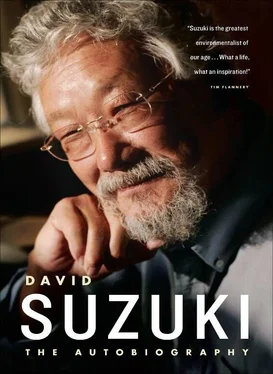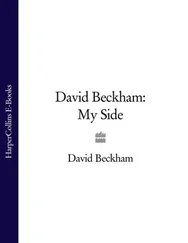The report, “Fish on the Line,” concluded that salmon runs were in trouble along the coast of B.C. It put the responsibility for the problems on the Department of Fisheries and Oceans (DFO), indigenous peoples, and commercial and sport fishers — in other words, on everyone with a stake in the future of the fish.
With so much finger-pointing, it upset everyone, as expected. All interest groups knew the fish were in trouble, but none was willing to give up its share of the bounty. The report was criticized bitterly, and the media played up the angry critics. The David Suzuki Foundation had a major impact in delivering the message that the salmon runs were in trouble, and that there was clearly a need for a different management strategy. Now, what could be done about it?
In our next study, Lynn Pinkerton, today a professor at Simon Fraser University in Burnaby, B.C., and Marty Weinstein, adjunct professor at the UBC Fisheries Centre, both longtime workers in First Nations communities, identified common features in sustainable fisheries around the world. In all such cases, the resource was managed by the local fishing community, which not only was responsible for maintaining stocks but also was held accountable for their state, and the knowledge and experience of the fishers themselves provided the basis for the fishing practices. These findings were published in a report entitled “Fisheries That Work.”
Canada attempts to manage its Pacific and Atlantic fisheries from faraway Ottawa in Ontario and relies on government experts who are not free to state the scientific evidence in public or to make recommendations based on it; government scientists are under intense political pressure to provide information and advice that support the government of the day. The observations and advice of those who make a living on the ocean and in rivers and lakes are rendered marginal or ignored. Such an approach on the east coast of Canada has been catastrophic — the cod fishery, for example, has long since collapsed — yet DFO has been unresponsive to the knowledge of local fishers.
“Fisheries That Work” was a good-news report, giving lots of examples of what works elsewhere and answers to outstanding questions. It was well received by local fishing communities, but the study received almost no play in the media. Crisis and confrontation make stories, but good news is deemed to be boring.
Undaunted, we funded a group of First Nations, commercial fishers, tourism operators, and environmentalists in the village of Ucluelet on Vancouver Island to apply community management of the local fish. The jury is still out on whether local management of species of salmon that migrate long distances can work when they are intercepted in the ocean. As a model for other projects, our fisheries studies provided a good one — do the analysis, look for solutions, then apply what was learned.
Since then, the foundation has funded numerous fisheries projects, including University of Victoria biologist Tom Reimchen's seminal work on the biological marriage between salmon and the rain forest; a province-wide DSF-sponsored inquiry on salmon led by the eminent B.C. judge Stuart Leggatt; a report on the DFO's policy of licensing the killing of spawning herring just for the roe; and a challenge to salmon farming.
THE GROWTH OF SALMON farms on the west coast of British Columbia has been cancerous. Today, production of salmon from open netpens dwarfs the number of wild fish captured. But these developments have been accompanied by numerous problems, and our foundation has played a major role in publicizing the dangers.
To many people, salmon aquaculture seems the marine equivalent of farming on land — use the ocean currents to slosh through nets that confine large numbers of animals whose growth is sped by regular feeding. The premise is that we can improve on nature with greater survival, faster growth, and year-round availability of the fish. But as we are learning from experience with cattle, poultry, and hogs, feedlots create enormous problems of disease, inhumane conditions, and waste.
But salmon aquaculture is wrongheaded from the very start. For one thing, unlike cows, sheep, and pigs, the fish are carnivores. They must eat fish. If we don't raise lions or wolves for food, why do we grow salmon? Food fish like anchovies, herring, and sardines, which people in South America eat, are being depleted to make pellets to feed salmon. As well, vast quantities of feces accumulate beneath netpens; diseases and parasites like sea lice explode and spread to wild fish, and large numbers of alien Atlantic salmon — also being raised in west coast salmon farms — escape periodically into the Pacific. Sea lions, otters, eagles, seals, and other predators attracted to the concentrated fish in nets have been legally killed by feedlot operators to protect their “crop.” And the flesh of the farmed fish is contaminated with chemicals biomagnified from the feed fish, antibiotics, and dyes to color the flesh.
Aquaculture, like agriculture, must be a part of the food future for humanity, but it will be sustainable only when practiced according to principles that will ensure continued ecological, social, and personal health. Global health, environmental, and equity issues are poorly handled by advocates of salmon aquaculture, and chefs and the public in B.C. are catching on and showing signs of discriminating in their buying.
Ecological health also can be restored on a small, local scale. Salmon are at the center of one of our most gratifying projects, revitalizing the run to Musqueam Creek in Vancouver. In 1900, the area that now encompasses the city boasted more than fifty rivers, streams, and creeks, each with its own genetically distinctive races of salmon. Some waterways might have had fewer than a hundred spawners returning, others had hundreds of thousands, but together they supported millions of fish. The past century of human encroachment has meant creeks were filled in, streams diverted, and riverbanks cleared of vegetation and polluted as our needs trumped those of the fish. At the end of the twentieth century, only one stream in Vancouver still had wild salmon runs — Musqueam Creek.
The creek runs through the Musqueam Reserve on the west side of Vancouver, home of the Musqueam First Nation, but only a dozen or so salmon were making it back to spawn. In an area that is now heavily populated and includes many properties with riding stables, Musqueam Creek was under pressure from horses ridden through it, children playing in it, and the runoff from storm sewers and homes illegally hooked up to dump sewage into it.
In 1996, the David Suzuki Foundation was approached by the Musqueam people to help rehabilitate the creek. Willard Sparrow, grandson of the famous chief Edward Sparrow Jr., had become very concerned; in a way, the survival of that tiny salmon run seemed symbolic of the fate of his people. Could the old ways and the salmon they depend on be retained in an increasingly urban setting?
Nicholas Scapiletti was working for the foundation at the time and hit it off with Willard as the two of them began a campaign to raise money to clean up and protect “Vancouver's last salmon creek” and to educate people in the neighborhood. The Musqueam Watershed Restoration Project was begun to train Musqueam youth to care for the waterway, shore up its banks, create baffles to slow the water, plant trees along the edge, put up signs, and distribute informational flyers. Willard educated his people about the symbolic importance of the creek and got them to support a small group of stream keepers. Once, Willard was wading in the creek to check it when to his delight a woman on horseback spotted him and yelled, “Hey, the Musqueam are trying to bring the salmon back in that creek, so get out of there!” The neighbors had now taken ownership and pride in this small stream and were watching over it.
Читать дальше


![David Jagusson - Devot & Anal [Hardcore BDSM]](/books/485905/david-jagusson-devot-anal-hardcore-bdsm-thumb.webp)









